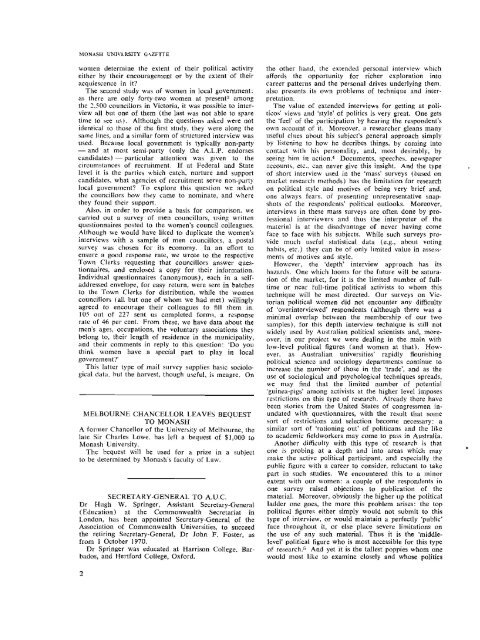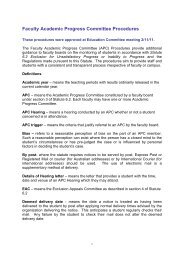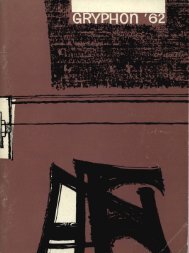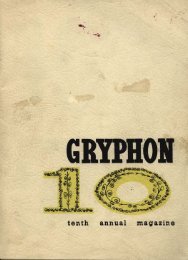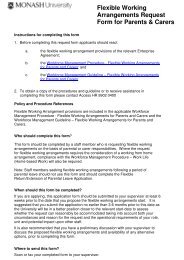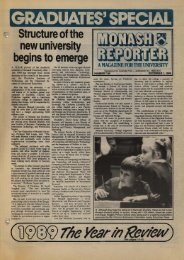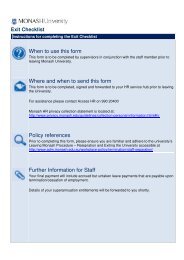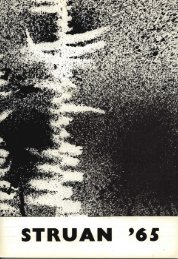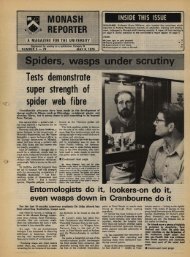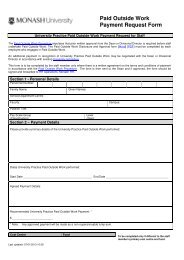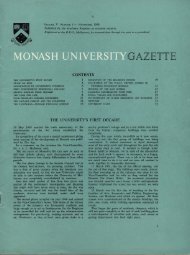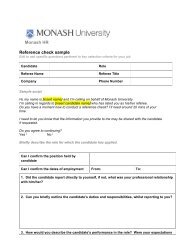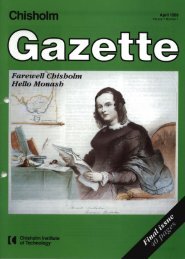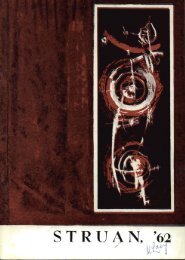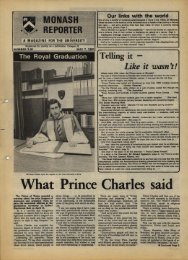Volume 6 Number 1 - Adm.monash.edu.au - Monash University
Volume 6 Number 1 - Adm.monash.edu.au - Monash University
Volume 6 Number 1 - Adm.monash.edu.au - Monash University
You also want an ePaper? Increase the reach of your titles
YUMPU automatically turns print PDFs into web optimized ePapers that Google loves.
MONASH UNIVI.RSLTY G·\ZFTTEwomen determine the extent of their political activityeither by their encouragement or by the extent of theiracquiescence in it'?The second study was of women in local government:as there are only forty-two women at present" amongthe 2,500 councillors in Victoria, it was possible to interviewall but one of them (the last was not able to sparetime to see us}. Although the questions asked were notidentical to those of the first study, they were along thesame lines, and a similar form of structured interview wasused. Bec<strong>au</strong>se local government is typically non-party- and at most semi-party (only the A.LP, endorsescandidates) - particular attention Vias given to thecircumstances of recruitment. If at Federal and Statelevel it is the parties which catch, nurture and supportcandidates, what agencies of recruitment serve non-partylocal government'? To explore this question we askedthe councillors how they came to nominate, and wherethey found their support.Also. in order to provide a basis for comparison. wecarried out a survey of men councillors, using writtenquestionnaires posted to the women's council colleagues.Although we would have liked to duplicate the women'sinterviews with a sample of men councillors, a postalsurvey was chosen for its economy. In an effort toensure a good response rate, we wrote to the respectiveTown Clerks requesting that councillors answer questionnaires,and enclosed a copy for their information.Individual questionnaires (anonymous), each in a selfaddressedenvelope, for easy return, were sent in batchesto the Town Clerks for distribution, while the womencouncillors (all but one of whom we had met) willinglyagreed to encourage their colleagues to fill them in.IDS out of 227 sent us completed forms, a responserate of 46 per cent. From these, we have data about themen's ages, occupations, the voluntary associations theybelong to, their length of residence in the municipality,and their comments in reply to this question: 'Do youthink women have a special part to play in localgovernment'!'This latter type of mail survey supplies basic sociologicaldatu. but the harvest, though useful, is meagre. OnMELBOURNE CHANCELLOR LEAVES BEQUESTTO MONASHA former Chancellor of the <strong>University</strong> of Melbourne, thelate Sir Charles Lowe. has left a bequest of $1,000 to<strong>Monash</strong> <strong>University</strong>.The bequest will be used for a prize in a subjectto be determined by <strong>Monash</strong>'s faculty of Law.SECRETARY-GENERAL TO A.V.C.Dr Hugh W. Springer, Assistant Secretary-General(Education) at the Commonwealth Secretariat inLondon, has been appointed Secretary-General of theAssociation of Commonwealth Universities, to succeedthe retiring Secretary-General, Dr John F. Foster, asfrom 1 October 1970.Dr Springer was <strong>edu</strong>cated at Harrison College. Barbados,and Hertford College, Oxford.the other hand, the extended personal interview whichaffords the opportunity for richer exploration intocareer patterns and the personal drives underlying them,also presents its own problems of technique and interpretation.The value of extended interviews for getting at polirices'views and 'style' of politics is very great. One getsthe 'feel' of the participation by hearing the respondent'sown account of it. Moreover, a researcher gleans manyuseful clues about his subject's general approach simplyby listening to how he decribes things, by coming intocontact with his personality, and, most desirably, byseeing him in action.e Documents, speeches. newspaperaccounts, erc., can never give this insight. And the typeof short interview used in the 'mass' surveys (based onmarket research methods) has the limitation for researchon political style and motives of being very brief and,one always fears. of presenting unrepresentative snapshotsof the respondents' political outlooks. Moreover,interviews in these mass surveys are often done by professionalinterviewers and thus the interpreter of thematerial is at the disadvantage of never having comeface to face with his subjects. While such surveys providemuch useful statistical data (e.g., about votinghabits, etc.) they can be of only limited value in assessmentsof motives and style.However, the 'depth' interview approach has itshazards. One which looms for the future will be saturationof the market, for it is the limited number of fulltimeor near full-time political activists to whom thistechnique will be most directed. Our surveys on Victorianpolitical women did not encounter any difficultyof 'overinterviewed' respondents (although there was aminimal overlap between the membership of our twosamples), for this depth interview technique is still notwidely used by Australian political scientists and, moreover,in our project we were dealing in the main withJow-level political figures (and women at that). However.as Australian universities' rapidly flourishingpolitical science and sociology departments continue toincrease the number of those in the 'trade', and as theuse of sociological and psychological techniques spreads,we may find that the limited number of potential'guinea-pigs' among activists at the higher level imposesrestrictions on this type of research. Already there havebeen stories from the United States of congressmen inundatedwith questionnaires, with the result that somesort of restrictions and selection become necessary: asimilar sort of 'rationing out' of politicans and the liketo academic fieldworkers may come to pass in Australia.Another difficulty with this type of research is thatone is probing at a depth and into areas which maymake the active political participant, and especially thepublic figure with a career to consider, reluctant to takepart in such studies. We encountered this to a minorextent with our women: a couple of the respondents inone survey raised objections to publication of thematerial. Moreover, obviously the higher up the politicalladder one goes, the more this problem arises: the toppolitical figures either simply would not submit to thistype of interview, or would maintain a perfectly 'public'face throughout it, or else place severe limitations onthe use of any such material. Thus it is the 'middlelevel'political figure who is most accessible for this typeof research.f And yet it is the tallest poppies whom onewould most like to examine closely and whose politics2


